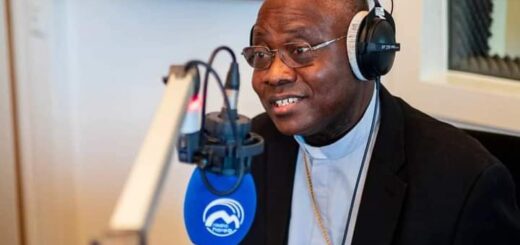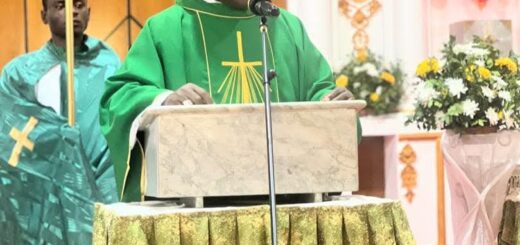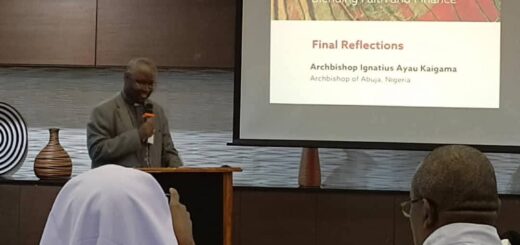The Mission to Preach the Good News
by ARCH BISHOP · July 14, 2024
15th Sunday in Ordinary Time, Year B, St. Kizito’s Church, Kuje, 14. 07. 2024. Homily by Archbishop I. A. Kaigama.
Readings: Amos 7:12-15; Ephesians 1: 3-10; Mark 6:7-13
The Mission to Preach the Good News
Coming to St. Kizito Parish, Kuje is always a delightful experience. I was here on the 14th of January for the ordination of fourteen of our deacons, of which one of them is your son. I returned to Kuje, this time, in the minor seminary on the 12th of March for the Deanery Cathedraticum. Today, the 14th of July, I am here again for a pastoral visit during which I will confirm 495 of your parishioners. It seems your parish has something with the number 14. Who knows if, before the end of the year, I will come again.
My dear parishioners of St. Kizito Parish Kuje, I bring you the blessings of our 2024 annual priests’ retreat of the Archdiocese of Abuja. We concluded this prayerful and reflective retreat two days ago. We prayed for you the people of God, as well as for the needs of our Church and the larger society. We ask you to continue to pray for your priests as much as you support them.
The themes of vocation and mission are highlighted today in the first reading and the Gospel. It is providential that your priests Rev. Fr. Henry Duru, CM, and his assistant, Rev. Fr. Matthew Yaro, CM, of St. Kizito Parish, Kuje, are Vincentians, also known as the Congregation of the Mission (CM), whose founder, St. Vincent de Paul was a very great missionary and taught his followers to be the same. No doubt, the Vincentian priests here are imparting to you the missionary spirit and culture.
In chapter 3 of the Gospel of Mark, Jesus summons those He Himself wanted. He said to them, I have chosen you to be with me… I will also send you out to preach (cf. Mk 3:14). In chapter 6, He sends them out in pairs, to proclaim the message of the Kingdom and gives them power to drive out demons. Archbishop Fulton Sheen once said, that the rhythm of the Christian life is “First come, then go”. We are summoned to be with Jesus, and like the disciples, we are sent forth to preach the Gospel by virtue of our baptism. The twelve were summoned and sent. That is where they got the name “apostles” – meaning in Greek, one who is called and sent forth. The mission of the twelve is from Jesus and through the power of Jesus. He sends them in pairs so that they can give reliable witness to the in-breaking of God’s kingdom. Deuteronomy 17:6; 19:15 states that two testimonies were required for a valid testimony. By travelling together, we encourage and support each other on the journey. This is why the Holy Father, Pope Francis has chosen the theme of synodality for the 2023/2024 Synod. He has invited us to see the Church as synodal. The word “synod” means “together with.” The official logo for the synod on synodality portrays the image of a group of people – laity, religious and clergy – journeying together under the guidance of God’s Spirit. A synodal Church means therefore that we journey together, listening to one another and encountering the Lord and others. We are not sent forth alone but with fellow disciples. This underlines the fact that the church is missionary by nature.
The Apostles are to take nothing with them for the journey except a staff, to signify the need of travelling light and focusing on the goal – to preach the Gospel to the ends of the earth, without allowing material things to pose obstacles on the way to this mission.
All of us baptized are called to be part of the mission of Christ, without exception. This is simply because there is no life without a task; no person without talent; and no moment without its call. We are all called to be apostles in addition to being “Christophers”, bearers of Christ. To succeed in this mission, we must first be with the Lord and draw strength and wisdom from Him. We must always find time, to come to Jesus in prayer, in the Blessed Eucharist and encounter Him in the sacraments in order to have a personal relationship and to absorb and assimilate His very character and behaviour. It is only then that we qualify to be sent.
The call to mission is for all, whether we are shepherds like Amos, ordinary Christians like the Ephesians, or disciples like the apostles, we are all called to participate in God’s mission of love and redemption, to bring healing and reconciliation wherever we go, especially in our land where clans, tribes, partisan politicians vehemently disagree and create high emotional stress and tension among people.
What does this gospel say to the Church today? In a country where poverty and social deprivation reign everywhere, how are we to interpret Jesus’ command to go without money or food, with only sandals, staff, and a single garment? Today’s Gospel reminds Christians and indeed all Nigerians, that corruption can drastically reduce if we learn to live simply, not one person acquiring greedily, more than he or she can ever finish in his/her life time.
We are called to step out in faith, knowing that God will provide for our needs. The apostles’ mission was urgent and vital, and so is ours. We are called to preach the Gospel, heal the broken-hearted, and bring freedom to those in bondage. Do this in any little way you can, since those in-charge of providing social amenities and infrastructure don’t seem to realize that people are groaning in despicable poverty. The psalmist’s plea for God’s kindness and salvation echoes our need for divine assistance in Nigeria today, knowing that His kindness and mercy will serve as a therapy for our woes.
We are called to rely on Divine providence, even in the midst of poverty, hunger and insecurity. Those who have the wealth, are called to use their wealth in helping those in need, caring for the marginalized, and alleviating suffering. If every Nigerian approaches wealth in this way, our nation will undoubtedly be a better place. However, when people cling to their wealth, allowing greed and self-centeredness to dominate, the result is perpetuated poverty and ongoing suffering. This is the situation we unfortunately, find in today’s Nigeria.
Today also, Amos teaches us that God’s call often comes when we least expect it, and it might lead us to places and tasks that seem beyond our capabilities. God chose Amos, a poor farmer, to prophesy in Israel’s northern kingdom. God knew that there were prophets there. These prophets were not His choice because they had compromised their calling. They were distracted and corrupt, and no longer delivered justice to the people. Instead of speaking for the poor and the oppressed, they worked for their pockets, accounts, and stomachs. Hence, in their place, God chose Amos. Amaziah, the false prophet was more interested in material benefits, he saw the task of a prophet as a profession instead of a vocation, hence he tells Amos to go back to Judah and earn his bread there (cf. Amos 7:12). Despite the opposition and challenges he faced from the “professional and paid prophets,” Amos fulfilled God’s purpose for choosing him. He was not stained by the corruption and materialism of his time.
As we reflect on these readings, we preachers must ask the Lord, to be like Prophet Amos, and to trust that God will equip us in the present situation of multiple challenges to have the courage to stand firm in our faith, even in the face of opposition and rejection. No matter how hopeless the situation may be, God is still calling us like Prophet Amos, to participate in His mission, by using our gifts and talents to serve others, to be vessels of His mercy and instruments of His peace in families, communities, and everywhere, trusting that God will provide for our needs.
As all of us leave this place today, let us carry with us the courage of Amos, the trust of the apostles, and the gratitude of St. Paul, who praises God for the spiritual blessings received through Christ, by being chosen, adopted, redeemed, forgiven, and sealed with the Holy Spirit. Let us be attentive to God’s call in our lives and respond with a willing and faithful heart. May we be instruments of His love and grace, bringing His message of salvation, His light and love to all whom we encounter. Above all, let us aim “To be holy, and spotless, and to live through love in his presence…. that we should become his adopted sons”
Finally, we pray through the intercession of our Mother Mary, that God will touch the hearts of our leaders to alleviate the suffering in the land and make things better for everyone.




